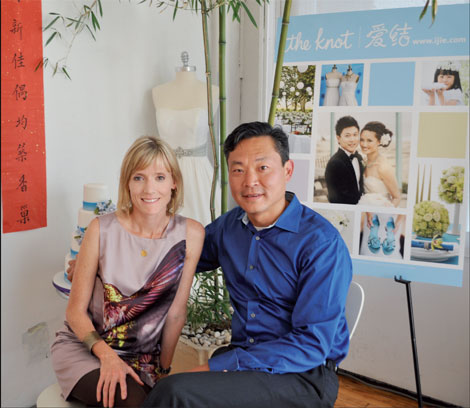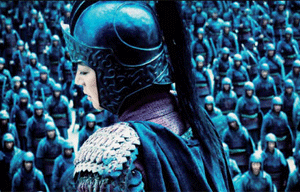Still in love with Chinese market
Updated: 2011-10-21 09:08
By Ariel Tung (China Daily)
|
|||||||||
|
|
One year later, China's version of theknot.com is thriving
The new marriage ruling may have reversed a woman's right to the marital home should a marriage dissolve, but wedding guru David Liu advises against focusing on the material aspect of a marriage. After all, marriage is about love, he says.
Liu is the CEO and co-founder of XO Group Inc, formerly The Knot Inc, which owns a leading United States website that provides resources for couples who are preparing for a wedding, a home or a baby. XO Group owns TheKnot.com, WeddingChannel.com, TheNest.com, and TheBump.com. It is based in New York City and also has offices in Los Angeles; Austin, Texas; Redding, California; and Omaha, Nebraska.
In November, XO Group ventured into China with the launch of its new information platform Ai Jie, which means love knot in Chinese. The website, www.ijie.com, is the Chinese counterpart to TheKnot.com, TheNest.com and TheBump.com, infusing Western inspiration with local advice for Chinese consumers.
The new marriage ruling offers an opportunity for Ai Jie to promote what marriage stands for. On Sept 15, Ai Jie launched a campaign called "Shanghai believes in love", in which advertisements on buses and the radio in the city drive home the message as well as promote the company.
Liu understands that being practical is strongly embedded in the Chinese culture, even when it comes to marriage.
"In China, people want to have a house before they get married. We wish to remind them that marriage is about love for the other person. It's not about a house," Liu says.
While Liu is of Chinese heritage (his parents migrated from China), he was born and raised in New York City. He met his wife, Carley Roney, when they were undergraduates at New York University. They were merely acquaintances at that time, but when they bumped into each other at an alumni event years later, they fell in love and got married seven months later.
In 1996, Liu and Roney predicted that couples would increasingly rely on the Internet to plan their weddings, and thus started The Knot. They never looked back.
These days, the growing wealth of Chinese people also means that many are willing and able to splurge on their weddings, especially in a culture where an extravagant wedding is a symbol of wealth and pride.
The statistics are positive. According to Stephanie Zheng, director of strategy and operations at Ai Jie, 12 million Chinese couples got married last year, and young couples are willing to spend 90 percent of their savings on their wedding day.
As the quality of life in China improves, couples want a fusion of Western and Asian wedding traditions.
"They are increasingly incorporating the elements of a 'white wedding', such as a diamond ring, white wedding dress and multitiered layered cake, which were not that popular in China 10 years ago," Liu says. "Now they see it as a symbol of status and prosperity."
With the Chinese society becoming more affluent, as many as 70 percent of Chinese couples want to travel abroad for a honeymoon, according to Zheng. She also says that professional wedding photos have become a necessity for engaged Chinese couples.
All of these wedding expenditures are creating a lucrative matrimony market for businesses such as Ai Jie. According to Zheng, 98 percent of couples in Shanghai hire a wedding planner for the big day.
Although Liu started Ai Jie less than a year ago, he already has more than 100 employees in China, compared to 500 at his US business, which he began 15 years ago. The offices in China are all in first-tier cities - Beijing, Shanghai, Guangzhou and Hong Kong.
Liu foresees that his business in China will surpass his business in the US in a few years.
"China has 1.35 billion people. China is a lucrative market not just for the scale of the country. It's GDP amounted to $4.99 trillion in 2009. Its rapidly growing affluent wedding market is valued at $62 billion," Liu says.
China's Internet penetration - at about 35 percent - lags that of developed regions such as North America, Japan, Singapore and South Korea, according to the Data Center of China Internet and ijie.com analysis. This means room for growth for Ai Jie, Zheng says. As Internet usage increases, it is predicted that more Chinese couples will turn to the Internet to plan a wedding.
In July, ijie.com announced a partnership with Sina Corporation, a leading online media company in China, to launch a weddings channel on Sina.com - one of the most-visited news and lifestyle Internet portals in China. The strategic alliance will enable ijie.com to reach a huge audience of Chinese women, Liu says.
The next step for ijie.com might be the luxury goods market in China. In 2015, the luxury market is China is estimated to be worth $27 billion, according to Liu.
"The average Chinese millionaire is 39 years old, which is 15 years younger than their counterparts in Japan, Europe and the US. One-third of the Chinese millionaires are women. This would be a good slice of the market for luxury goods makers," Liu says.
But not every business that enters China has it so easy. It can be especially hard for foreigners to break into the market if they don't understand the language and culture.
"You need to overcome all the stringent regulations and requirements. You also need to conduct business based on guanxi (relationships), but we were lucky. We met the right people at the right places who introduced us to other people," Liu says.
"You can't go in without first understanding the language, culture and business practices in China, which are very different from those in the West."
He says his business formula in China is similar to that in the US, but with a few tweaks.
"You need to localize your business and hire local staff ... . You can't just run a business in China the same way you do it in other places. You got to tailor it to suit the local market preference, taste, income, etc."
(China Daily 10/21/2011 page16)












